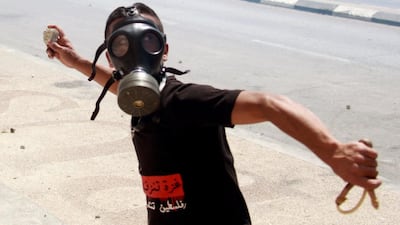As Hamas’s conflict with Israel continues to play out despite failed ceasefires and mounting, scandalous human carnage in Gaza, its long-term aims are becoming clear.
From the outset it was obvious Hamas found itself trapped in a dreadful box in Gaza and was looking for a way out. So attention focused on easing the blockade and, above all, shifting Egypt's policies. But as the war has continued, it seems increasingly clear that what Hamas really wants is to gain a solid and permanent foothold in the West Bank.
Hamas’s reported capture of an Israeli soldier – which it denies – could constitute the first tangible and exchangeable asset it has acquired during the fighting.
If true, and the soldier can be retained by Hamas, the primary aim of the unlikely coalition that has emerged to try to thwart its most sweeping ambitions, which is to deny the organisation a major political benefit, will fail.
Israel always seeks to exchange prisoners, much as it never freezes settlements. Therefore, release of the “security prisoners” recently arrested by Israel could actually be secured in the long run by Hamas.
Moreover, Hamas has survived, and given the Israeli army a few painful hits, to the evident surprise of its enemy.
Another primary aim of Hamas has been to establish itself as the principal Palestinian diplomatic and political address for Gaza, placing it on a par with the PA in Ramallah. President Mahmoud Abbas has been struggling to undermine any such development by remaining crucial to Palestinian discussions with Egypt and other key Arab states.
Yet the inclusion of Hamas and Islamic Jihad members in a Fatah-led delegation to Cairo today could be seen as a step forward for the militants.
So can the United States seeking to use the good offices of Turkey and Qatar as leverage with Hamas, at the expense of the Palestinian Authority and to some extent Egypt, and to the outrage of Israel.
But despite all of this Gaza-centric manoeuvring Hamas’s conduct suggests a more sweeping ambition. Gaza was always a burden. It is overpopulated, underdeveloped, impoverished and non-viable. And since the Egyptian crackdown following the removal of former president Mohammed Morsi, Hamas has felt politically strangled there amid a profound budget crisis and economic meltdown. Its governance has been beyond abysmal.
Rather than serving as a launching-pad for a broader takeover of the Palestinian national movement, Gaza turned into an open-air prison, not just for its long-suffering people but also for Hamas. Gaza was increasingly a liability more than an asset. For many months now, Hamas’s eye has been squarely on the West Bank.
One of the first real efforts to break out of Gaza and into the West Bank by Hamas was the unity agreement with Fatah. But this brought neither much financial relief from Ramallah nor a stronger foothold in the West Bank. And whatever progress they were making was strongly disrupted by Israel’s crackdown last month.
There are at least two ways Hamas might be trying to parlay the current conflict into a greater presence in the West Bank. First, if it can emerge with tangible benefits, whether political or strategic for the organisation, or deliverables for the people living under their rule, their message of “resistance” will gain a great deal of traction against the PA policy of peaceful negotiations.
Second, if Hamas can somehow engineer a third intifada in the West Bank, or if one erupts spontaneously, it’s almost certain that this will almost immediately become violent and the organisation could quickly manoeuvre to play a leading role.
Last week’s unprecedented demonstrations in Jerusalem, the largest in living memory, gave a hint of how such an uprising could emerge. And Hamas has been repeatedly calling for “days of rage” and so forth in an effort to stoke the flames. If such a conflagration were to emerge, it might be exceptionally difficult for the PA, or Israel for that matter, to stop Hamas from being a primary beneficiary.
Hamas is sticking doggedly to the unity agreement with Fatah for several reasons, including hopes that it will still provide the basis for a greater presence in the West Bank. The PA, too, keeps reaffirming that agreement to position itself for a major role in a ceasefire. One potential solution could involve stationing PA security forces and international observers, rather than Hamas, along the border crossing with Egypt.
At one register, this could give the PA a new foothold in Gaza. But Hamas might be looking beyond that in an effort to exchange exclusive control of Gaza for a greater presence in the West Bank, that it hopes will eventually lead to the eclipse of the secular nationalists and the final triumph of the Islamists.
Those who do not wish to see Hamas emerge politically triumphant from this chaos, and in a greatly enhanced role in the West Bank, is going to have to make sure that, as the dust settles, the PA acquires greater clout, credibility, centrality and deliverables for the public. Otherwise, it’s going to be hard to counter Hamas’s message that its approach alone achieves results.
Hussein Ibish is a senior fellow at the American Task Force on Palestine and blogs at www.ibishblog.com
On Twitter: @ibishblog


